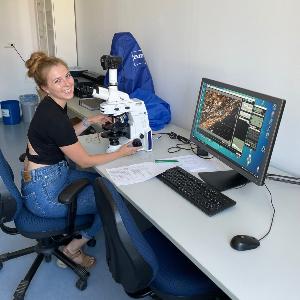Doctoral Study
Your path to a doctorate at the Faculty of Geosciences.

Your path to a doctorate at the Faculty of Geosciences.

Are you thinking about a doctorate? First of all, think about the field of research you would like to work in. The choice of your doctoral topic is of central importance, because those who research with enthusiasm will reach their goal in the end!
Afterwards, you should find a supervisor for your doctoral project who is authorized to conduct examinations.
Please contact one of our scientists directly. Information on the research areas and an overview of the professors can be found on the department pages:
Supervisors
Find and contact a university lecturer independently (all professors, private lecturers and, under certain conditions, heads of junior research groups at the university, for more details see § 6 of the doctoral regulations (PDF, 275 KB)). In consultation with this person, you will look for another person to take over the co-supervision.
Admission
You must be formally accepted as a doctoral candidate at the Faculty of Geosciences at the beginning of your doctoral thesis.
Please submit the following documents to the Doctoral Office:
In the course of admission, please also register electronically using the online registration form.
Depending on where you are from and depending on where you obtained your Master degree, the International Office or the Office of the University Registrar is responsible for enrollment as a doctoral student. Please follow their instructions on the information page.
Please note:
After the Doctoral Degree Regulations dated February 19, 2024, the intermediate doctoral examination has to take place no later than one year after acceptance as a doctoral candidate. It is conducted by the doctoral committee (both supervisors and one additional committee member).
You can look up the information on the intermediate doctoral examination in article 8 of the Doctoral Degree Regulations dated February 19, 2024 (PDF, 275 KB).
You do not know by which date you should take your intermediate doctoral examination? Look on your Application for Admission to Doctoral Sciences or your Letter of Acceptance - if not stated otherwise, the date of acceptance is the date of the signature of the doctoral committee chair - the latest date of the intermediate examination is one year later.
Information on submission in accordance with the doctoral degree regulations of August 18, 2006
Procedure after submission:
When do I have to submit my thesis in order to meet a certain disputation date?
Unfortunately, there is no general answer to this question, as the time frame from submission to disputation can vary greatly. Among other things, it depends on
The date of the disputation can therefore only be finalized as soon as the display has started and it is therefore foreseeable when the assessment will be completed.
The disputation or “defense” consists of a 30-minute presentation by the candidate and a subsequent academic discussion (see § 14 Doctoral Degree Regulations of August 18, 2006/ § 14 Doctoral Degree Regulations of February 19, 2024).
The disputation is held before the six-member (Prom. Ord. of August 18, 2006) or three-member (Prom. Ord. of February 19, 20024) doctoral committee and the presentation is open to the public.
How do I manage to present my work within 30 minutes?
30 minutes is not much time to present years of work on a topic - the trick is to leave out everything unnecessary. It is important, especially at the beginning, to make it clear to people who are not familiar with your field in detail why you have worked on this topic and why it is important. Then you can and should show your detailed knowledge, your results and interpretations in depth. In the end, it is important to convey an overall picture. Save any details that you do not have time to cover for the discussion. Here you can go into much more depth when answering the committee's questions.
After submitting your dissertation and passing the oral examination, you are almost there - the doctoral title is within reach.
Please note, that the preliminary notification you receive after the oral examination does not yet entitle you to use the doctoral title; designations such as Doctor designatus (Dr. des.) or similar are also not permitted. Only after receiving the certificate you may officially use the title Dr. rer. nat. or Dr. phil.
In order to receive the doctoral certificate for the award of the title you must

Office for the Promotion of Young Researchers / Doctoral Office
Address of the doctoral office of the Faculty of Geosciences:
Ludwig-Maximilians-Universität München
Fakultät für Geowissenschaften
Promotionsbüro
Luisenstraße 37, Room A 230
80333 München
Closing times:
August 7, 2025 - August 26, 2025
October 23, 2025 - November 1st, 2025
Here you will find all documents and information relating to doctoral studies.